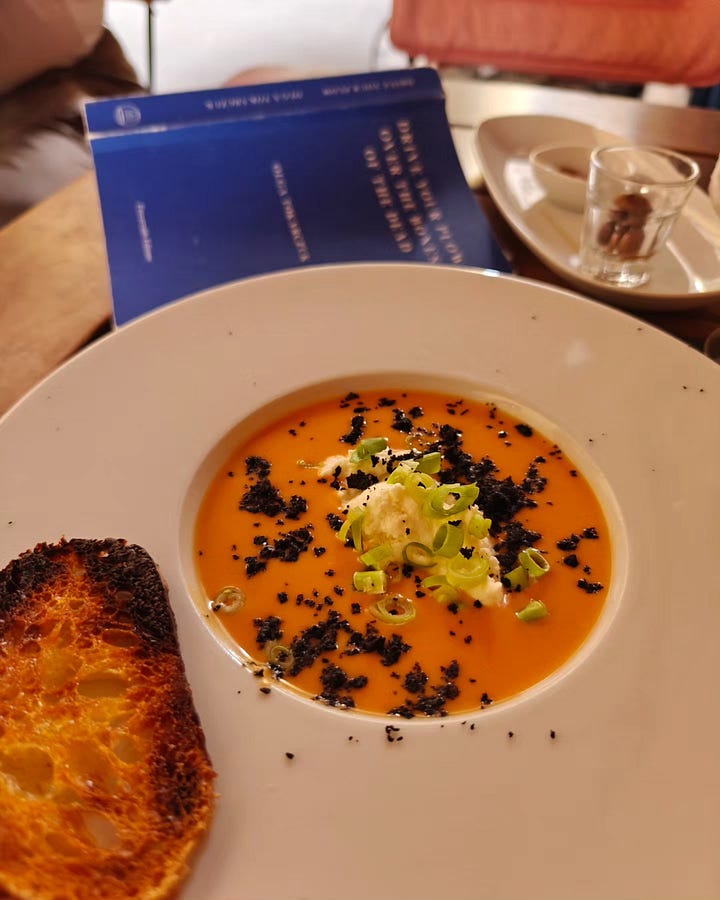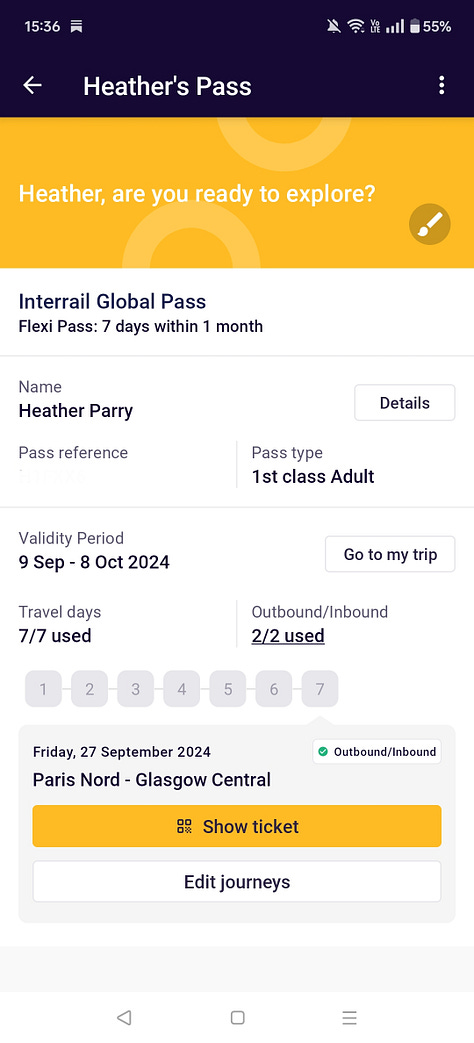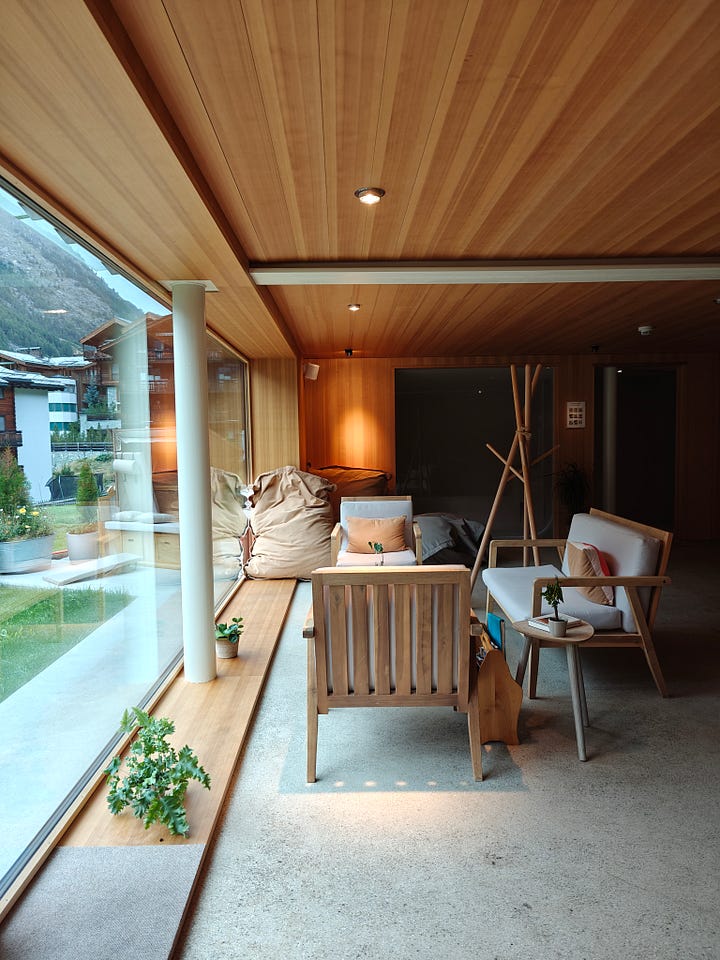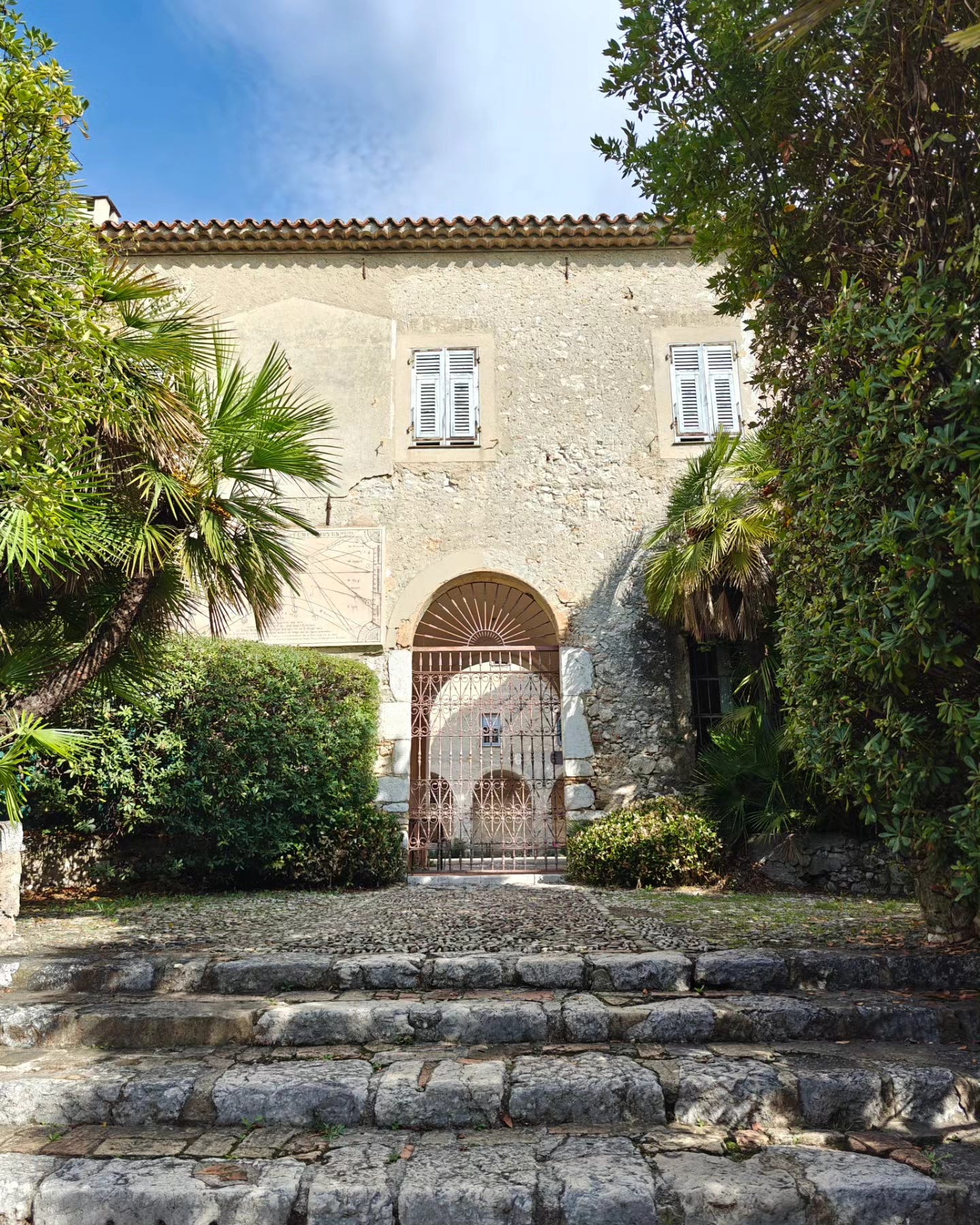This is the second part of a two-parter about slow-travelling from Glasgow to Tuscany and back; read the first part here:
to Tuscany, by train: part 1
When I was 21, I moved to Canada; student visas were easy to come by and I went without contacts, a place to live or any potential job. My grandmother, the one on my dad’s side, was fretting hugely when I went to say goodbye; it’s not that far, I told her, and if all goes wrong I do have a flight home. She said this to me: you have to realise, Heather, …
A week is not a long time, especially not in a place like Tuscany, but during a week at Write Toscana with two friends I had: a) discovered I love opera, b) shaken a forthcoming book free from a neurosis cage I’d built around it, and c) drank far too much excellent wine.
My journey home was going to be shorter than my outward trip, and while the Milan-Paris route remains closed due to a landslide, I was going going to take the other option: not through Switzerland, but around the north-west coast of Italy to Nice, then up to Paris and home.
Massimo, the lovely (and very patient) Italian taxi driver dropped me off at Barga-Gallicano station, from which I went to Aulla Lunigiana, La Spezia Centrale, Genova, Ventimiglia then to Nice, on the Cannes train. For some unknown reason I’d chosen a two-hour stopover in Aulla Lunigiana, where there is quite literally nothing except some shops and an industrial estate, rather than La Spezia, a picturesque port on the Cinque Terre. Do not repeat my mistake. Thankfully by the time I got to La Spezia station it was pissing it down, so I didn’t miss much scenery—but neither was it replete with high quality lunch spots as I had (stupidly) hoped. My advice: google Italian stations before you assume anything at all.
By this point in the trip, I had realised that Italian trains operate on a timetable that swims in the same waters as the printed schedule, but is not pinned to it. All of a sudden, my 20-minute stopovers became a source of stress, because you might roll into a station fifteen minutes late, with no reason as to why, and your casual should-have-time-to-grab-some-food break is suddenly now a two-minute dash to your next platform. By the time I made it to Nice, some ten hours after my first train, all I’d eaten since breakfast was a bar of Swiss chocolate I had stashed in my bag for exactly such an occurrence.
The train around the coast to Nice gives you a fascinating peek into the lives of the mega rich / tax avoiding as it skirts Monaco; lots of flat blue sea, lots of yachts, lots of departing people dressed as if they’re wealthy, but clearly without the means (the rich don’t arrive by train). It’s definitely worth snagging a seat on the waterside, especially if you’re travelling into Nice as the sun goes down and / or suffering from mild hallucinations due to an excess of Swiss chocolate.
If you hadn’t gathered from part one, my ideal day in any European city involves walking around for hours, stopping at good coffee places and bars and restaurants, dropping into a couple of galleries and having random interactions with total strangers. Nice really delivered on this front, not least on the coffee, which was a bit of a relief after a week of espresso (sorry, Italy—I love you but I don’t love your coffee). After a morning walk up the beach and breakfast, I climbed up to the Cimiez Monastery and took a look around its beautiful gardens, which give a phenomenal view across the city. Honestly, though, I was kind of killing time until lunch.
Having previously been vegan for over a decade, over the last year I’ve been on an exploration of cheese and seafood, not only rediscovering things I avoided for twelve years but eating things I’d never had before, having grown up in a household that wasn’t entirely adventurous when it came to food. I’d looked into niçoise specialities that weren’t the obvious salad, and everywhere I’d been told to try bourride, a kind of Provençal take on the more stressful bouillabaisse. So I researched the best place to try it, and I landed on Bar des Oiseaux.
My favourite thing about France is its commitment to cheap lunch menus; at this place I was able to get a gazpacho (something I’ve only learned to love this year, having had an unbelievable salmorejo in Bourdeaux in the summer) which had a thick and decadent goats cheese plopped right in the middle (inspired), and the aforementioned bourride for just €22; add in wine and an espresso and you’re still under €30, plus they serve you bread in a little paper bag. The bourride contained pasta, which was unexpected, but was more delicious than I ever hoped; monkfish is an essential part of bourride, but this one also contained both mussels and tiny fried octopus. I struggle with certain textures of food, often against my own will; I have decanted the water out of oysters and enjoyed it but I know if I tried to eat one I would immediately puke. I’ve eaten mussels twice, and kind of winced each time. But these were just perfect—not too soft, not too chewy—and this spurred me onto try the octopus, which I would not have been able to eat if they were any bigger or any less crispy. Underneath the pile of seafood and rocket was the key to bourride—the aioli—which is often made too sickly or too garlicky; here, once again, it was perfect. I swept up any remnants of the stew with the remaining bread and took my time over the wine. The Provençal sun warmed my feet and the old French couple next to me grinned. Later, after more walking and two disappointing galleries, I had more wine, marinated fish, more bread, and ice cream: one cherry scoop, one tiramisu.


Leaving Nice was simple; my final French rail trip would be just one train, the high-speed Nice-Ville to Paris Gare de Lyon, taking just under 6 hours. I came prepared with an Emmental baguette and two pistachio sfogliatella, which are a bitch to eat without making a mess but totally worth it. The train filled up, but as everyone had a seat there was no problem—and the first class was roomy, comfy and generally just really pleasant.
In Paris, it was a quick couple of Metro stops to the Gare du Nord and my hotel, which is only 15 minutes away from the station; I’d stayed there last year and knew I liked it. By chance, on my train, I’d seen that the wildly talented and lovely Jan Carson was in town, so we ended up sheltering from the horrendous rain together with a bottle of wine, lots of publishing chat and some perfectly acceptable pasta that evening.
Paris continued to deliver on the absolute shit weather for the whole next day, so I mostly bounded around between cafes and galleries (the Picasso museum, which IMO is over-priced and under-filled, something I did know prior to this visit but had forgotten). I treated myself to lunch at Benoit, which again has an affordable lunch menu, this time including profiteroles that come with an actual tureen of hot chocolate sauce; I’ll be honest that this still wasn’t anywhere near as good as my Nice lunch, but it was lovely. In the evening I had an early dinner at my favourite chaotic institution Bouillon Chartier, then I went to the opera.



Two weeks prior to this I didn’t know I liked opera; I had been introduced in Lucca, and found it a transcendence experience. With a spare evening, I looked up Paris operas, and found that if you go to Palais Garnier at 11:30 in the morning, you might just be able to get a €10 ticket to the opera that night; the websites said you wouldn’t be able to see the stage, but you’d be able to see the orchestra and hear the proceedings. Worth it, I thought. I went, I bought my ticket, I didn’t do a single bit of research into the show or the production; it was going to be a production of Les Brigands, and that’s all I knew.
My seat was in a box next to the stage, and I don’t know whether I just got lucky, but I not only could see practically all the stage, I could just about reach out and touch the performers, had I wanted to. Out of the eight seats in the box, only three wouldn’t have had a view of the stage, and all would have been able to watch the orchestra perform. And thank god I could see the stage, because I got the surprise of my life when the curtain went up, and I was greeted with this:
Never in a million years did I imagine that I’d be watching the lead tenor in a Paris opera dressed as Divine, and I just about screamed with delight. The next three hours were so gloriously gay and riotous that the homophobic couple next to me left; despite understanding about five percent of the dialogue and lyrics I laughed my ass off. It was an absolute joy; if you’re going to Paris in the next wee while I totally recommend it. Just look at how they styled the Spanish:
The next day, it was finally time for home: a short walk to the Gare du Nord, an uneventful Eurostar, a train to Glasgow where I got chatting to the lady sat opposite me and just before her stop, realised that I had met her before; in fact, I’d interviewed her about seven years ago, for her book How to Be a Craftivist. She was on her way to the Wigtown Book Festival, to promote her new book, and neither of us had recognised the other for the preceding three hours. It was a fitting end for a trip that had been full of unexpected delights, from Pink Flamingo opera references, to beers and snacks at 2,486 metres, to thermal spas in the middle of the Alps. By the time I got home, I was already figuring out where I might Interrail to next (Morocco??).
I did a lot of research to figure out this trip, so let me share the details with you.
The Interrail pass
I bought the global (multi-country) Interrail pass, first class, giving me 7 travel days in 1 month); it was €388 (£326). I got 20% off due to a summer sale. Obviously the second class would have been cheaper, but I wanted to enjoy the journey, and not worry about fighting for space/pissing someone else off with my bag.
There are a ton of options for the pass itself, including unlimited travel for two or three months, but the one above just worked for me. If you are A Youth, you’ll pay even less.
The Interrail app is really very good, and to try and do this trip without it would be an act of unfathomable masochism. It acts as your digital pass (it gives you a separate QR ticket for each travel day), it lets you plan and book trains, and it holds all your seat reservations too (though you can’t book these reservations through the app, you have to do them via a browser). It’s kind of like the Trainline app, if the Trainline app was good.



It also gives you some really cute information about your trip, which I’m afraid I found very adorable. Yes, I spent two entire days on trains, 23 of them in total.



It’s important to know that for some trains in some countries, on top of having your pass you have to buy an additional “seat reservation”, costing from about €5 to €15; this isn’t the case in Belgium, the Netherlands and Switzerland, but it is the case in France and Italy, for instance. These seat reservation fees are higher for the "special” routes, which for my trip included both the Eurostar and the Glacier Express, an 8-hour daytime trip through the Swiss Alps.
If you’re trying to keep additional costs low, you can pick the less popular trains and routes to pay smaller or no seat reservation charges, which I mostly did. You can, however, change your planned route at any time. For one of my travel days I changed my mind on the route and decided I would pay an additional seat reservation fee for a more convenient journey; this was no problem and could be done in the app. In Switzerland I travelled earlier than planned and did so for no charge at all. The additional fees for my journeys were:
Glasgow - Lyon (inc. Eurostar) - seat reservations £43
(Lyon two nights)
Lyon - Visp: £0
Visp - Zermatt: £0
(Zermatt two nights)
Zermatt - St Moritz Glacier Express - seat reservation £42
(St Moritz two nights)
St. Moritz - Barga-Gallicano: £14
Barga-Gallicano - Nice: £0
(Nice two nights)
Nice - Paris: £10
(Paris two nights)
Paris - Glasgow (inc. Eurostar): £33
Total: £142.
Most of this extra money was for the Eurostar or for particularly lush experiences. For me, this meant that all of my train travel cost £468 altogether, £220 of which was covered for me—so I ended up paying £248 in travel for a three-week trip, first class, including some truly phenomenal train journeys. This is almost exactly the amount of money it cost me to get two of us from Glasgow to Bristol and back in the summer, a trip a quarter of the distance of this one (and that was WITH a railcard discount taking off 1/3), so you can imagine that to me, this seems quite ridiculously affordable.
I specifically haven’t included my hotel costs here, because we’re talking travel, not hotels. You might only do one overnighter; you might overnight on trains (which does incur an extra charge, I think); you might stay with friends in cities across Europe. Maybe you’re a hosteler; I have long passed my hostelling days. If you end up in Zermatt though I’ve got a hot tip on a great, cheap hotel, with a little spa that has a hot pool with a view of the Matterhorn.


The necessary (and sometimes hidden) details
Information on this is hard to come by, but if you buy a global Interrail pass you CAN travel within your own country on it—for two travel days total, one into the country and one out. What this means is that if you need to travel down (or indeed up) to London to get on the Eurostar you can do this for free on your pass, as long as it is on the same day that you travel on the Eurostar or otherwise get out of the country. The website and app both tell you you need to pay to book a seat reservation for this UK journey, but you don’t. The Man in Seat 61 explains why not, and how to book a seat for free (via GWR.com). In fact, as I found out from the lady at the Glasgow ticket office, you don’t actually need a seat reservation at all—but it’s probably a good idea, if you can, because we all know how intensely packed the trains can get (as the rail companies constantly run small trains and not often enough because they prioritise profit, not passengers).
The Interrail pass is also usable on the overground and the Elizabeth Line in London, though not the Tube—so if you’re lucky, you can get all the way from Glasgow to St Pancras without spending an extra penny.
Because I had paid for a First Class Interrail pass, I got the First Class Glasgow-London leg of my journey free (with free food and drink), before I got to London—and the same on the way back. This alone would have cost, at an absolute minimum, 70 quid (most likely £150-ish) in standard class with no sustenance. I also got a free meal and wine both ways on the Eurostar. What this means is that by the time I had arrived in Lyon, I had already had three free meals on the trains; all my food and drink that day was paid for, and the journey home from Paris was the same. Consider that you might spend £10-20 pounds buying a takeaway lunch for one meal plus drinks, and all of a sudden the extra cost for first class might be worth it.
If you go to Switzerland and want to do the gorgeous routes, there are certain tricks to avoid paying extra. The Glacier Express does require a seat reservation and a fee, though it’s literally hundreds of Euros less than if you were paying for the trip on its own; first class is 321 CHF (£285), while I paid just 49 CHF (£42) for my reservation. You don’t have to go all the way from Zermatt to St Moritz, and it is a long trip (almost eight hours), but I can’t describe how it felt to be going through the Alps, in the snow, with total views all around, nothing to do but look on in awe. Details on booking are here. However, do be aware that windows are made of glass, which is notoriously difficult to take good photos through, so go for the experience rather than for the pictures, or you might be disappointed (like some quite vocal American tourists sat behind me, who were not familiar with the material known as glass).
If you’re travelling from St. Moritz to Italy, or even just to Chur, you can get on the Bernina Express, which is more or less the same as any of the local trains except that it has panoramic cars with all round views. You’ll see all the apps and websites say that you have to pay a seat reservation fee for this train. However, unless you want to sit in the panoramic car, you don’t; as the Man in Seat 61 explains, there are three “Allegra” cars at the front of every Bernina Express, and these are unreserved and have a first class section. I was a bit unsure about this, but chanced it, and found myself completely alone in the Allegra car at the very front of the train with incredible views all around, for no reservation fee or extra cost. No one ever checked my Interrail pass either. And because I was right behind the driver, and he put his blind up, I got probably the best view possible.
Every train in both France and Switzerland left on time, was nice and stressless and didn’t smell of piss. Italy…. well, I can’t say that of Italy.
Italian trains are a real mixed bag. The big city-city routes (at least, in the north of the country) mainly have trains that are comfortable and spacious, and they at least seemed keen to stick to the plan; some have WiFi and first class and tables, but not all. Local trains, on the other hand, appear to be almost allergic to the concept of either leaving or arriving on time, perhaps as some sort of delayed RMT-style antifascist union statement against Mussolini’s famed punctuality. Very often the train I was on just sort of sat there until ten minutes past its scheduled departure time, and similarly I would find myself being very English on a platform as the expected train just didn’t show up until five minutes after it was supposed to, with no indication that anyone else had even noticed. The worst of my trip was when a train from Genova simply didn’t leave for an hour because an entire stadium’s worth of very loaded and angry Roma fans tried to get on, along with their attending fleet of heavily armed riot police. This almost derailed the rest of that day’s travel (no pun intended), but honestly the worst outcome would have been that I’d have to get a last minute hotel in Pisa; as it turned out, I changed my route and still made it to Barga. Italian train stations are incredibly mixed on the whole food front, though I was immensely proud of myself for managing to buy a focaccia sandwich and a pasta salad AND stopping to have a espresso during a 12-minute changeover at Milano Centrale. My advice is just not to have anything less than a 30-minute gap between trains in Italy, don’t expect mega long travel days to go without a hitch, and when you read on the internet that there is literally nothing in Aulla Lunigiana and you shouldn’t have an extended layover there, believe it.
I really thought that I would have an issue with presenting the Interrail pass instead of a ticket—if not in Europe, at least in the UK, where I assumed it was a lot less common. There was no issue at any time, other than having to have a staff member let me through the ticket gates at stations which had them; most European stations don’t have them, though, because Europeans know how to live.
While I am a noted enjoyer of travel admin, and am experienced in it, trying to plan and execute all this would have been impossible without The Man in Seat 61, on whose website I spent hours and hours in the planning stages of this. He was so helpful that I tried to donate to the website, but he doesn’t even accept those, instead asking people to donate to Unicef instead; I, of course, honoured those wishes. Thank you, nameless Man!
All of this is undoubtedly more complex than getting on a plane in Glasgow and ending up in Tuscany. It was more work, and more money, and took me a lot longer. But do I regret the trip? Not one bit. I had never before seen the Swiss Alps, nor travelled through the French countryside eating a cheese baguette, nor run into a coffee bar in Milan station to order and drink an espresso in two minutes. I had never been to the opera, nor eaten bourride, nor taken a trip up a mountain only to find that visibility was almost completely zero. I’d never drunk a beer discussing snow with a Swiss bartender halfway to the peak of Piz Nair nor dipped in a 40-degree grotto pool with a load of Swiss pensioners.
I know that not everyone has the time or the means to make this kind of trip; for all that I think we should be flying less, I am more than aware of the reasons that we don’t. But if you do have the time, the space, the money; consider the train. It took more time out of my life to do this trip, but it added a disproportionate amount of everything else back in.
My next novel Carrion Crow—a dark, physical book that ‘deduces an unutterable Gothic horror of class and gender from the pages of Mrs Beeton’s Book of Household Management’—is forthcoming in Feb 27th 2025—and you can support me, and this substack, by pre-ordering it here:









My memories of La Spezia are not good. Trying to get a hotel in the evening was impossible. When eventually my girlfriend and I found somewhere willing to take us we were asked how long for. "One night" I said. "The whole night??" was the reply. It was an interesting but noisy place. If you are willing to break your journey in Liguria, there are some beautiful villages just a few km inland, near the French border.
ily ✨